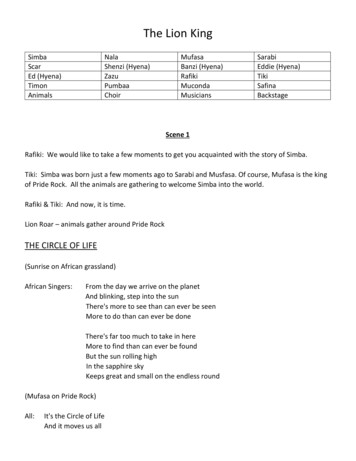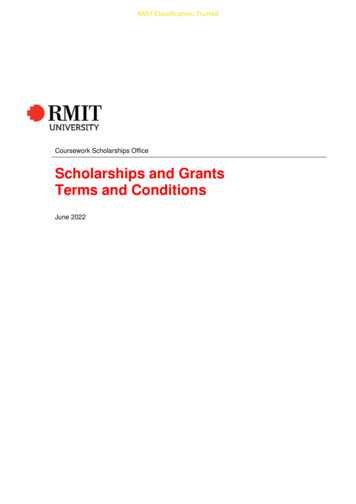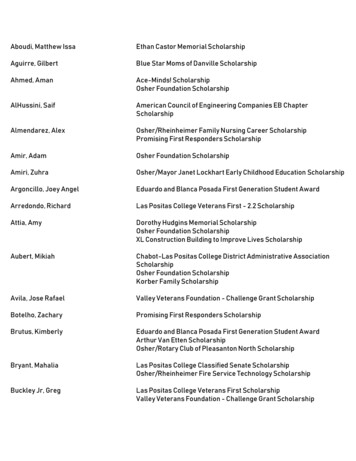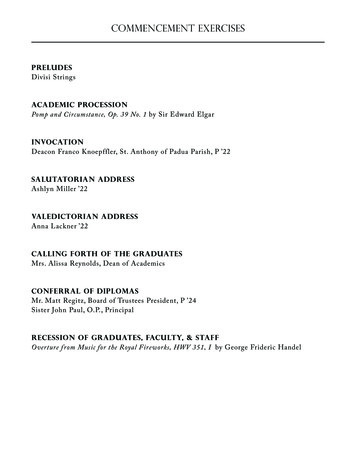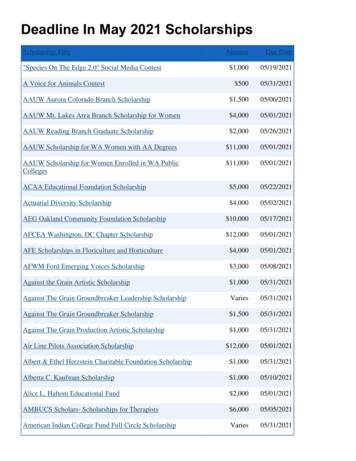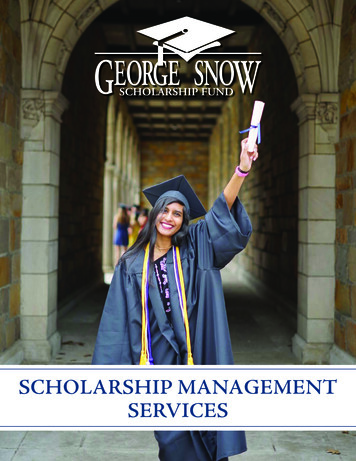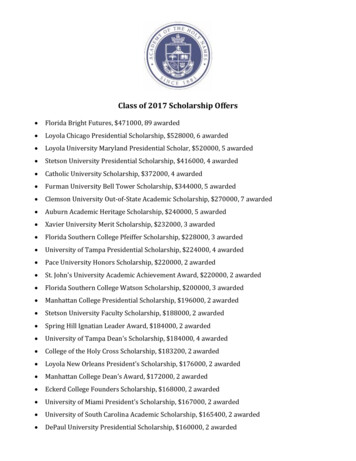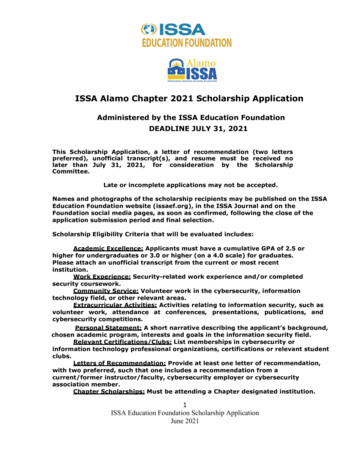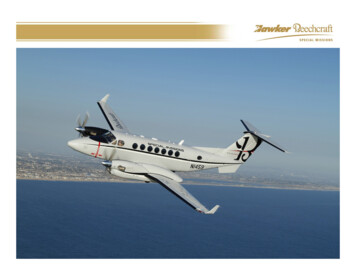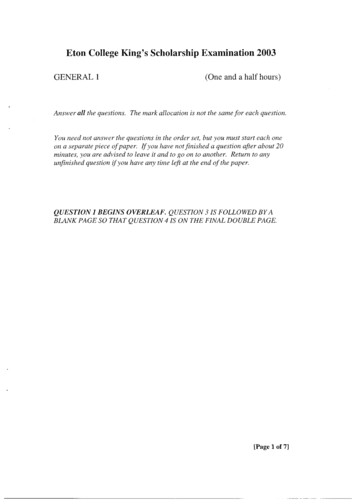
Transcription
Eton College King's Scholarship Examination 2003GENERAL 1(One and a half hours)Answer all the questions. The mark allocation is nor the same for each question.You need not answer the questions in the order set, but you must start each oneon a separate piece of paper. If you have not finished a question after about 20minutes, you are advised to leave it and to go on to another. Return to anyunfinished question if you have any time left at the end of the paper.QUESTION 1 BEGINS OVERLEAF. QUESTION 3 IS FOLLOWED BY ABLANK PAGE SO THAT QUESTION 4 IS ON THE FINAL DOUBLE PAGE.[Page 1 of 7]
I have a friend called Oily who told me all about his family. His parentswere called Malcolm and Nancy. Malcolm knew that two of hisgrandparents were English and that his father, Ian, was a quarter Irish.(You may assume that a child inherits a half of each of his parents'nationality).Nancy's paternal grandmother was called Fiona and she was half Englishand half Scottish. Oily had been told by his mother's mother Linda thatOlly's great grandparents on her side were called Graham and Heatherand that Heather was fully Scottish whilst Graham was half onenationality and half another.Ian had married a lady called Jane whose parents both had exactly thesame national origin and were called Charles and Dorothy. Nancy'sfather was called Kieran who was half Irish and whose father was calledEdward. Malcolm's paternal grandmother, Betty, was entirely Scottishand had a husband called Andrew who was half Scottish. Kieran's wifewas three-quarters Scottish.(a)Construct a diagram which displays the information about Olly'sfamily as logically and clearly as possible.[11](b)Oily told me that he was Scottish when in fact he has someScottish, Irish, English and Welsh blood in him. If Ian is threequarters Scottish, work out what fraction of each nationality Oilyactually is, making sure to show your working.[7](c)Oily has a younger sister and brother. Suggest names for themthat the rest of the family might approve of and explain yourchoice.[2][Total 20J[Page 2 of 71
2. Consider the following information then answer the questions below.GHQAbove is an extract from a modern musical composition written in squares each ofwhich can be repeated once or more. The squares contain approximate information forthe performers about pitch or volume or duration or a combination of these.This extract is for three instruments, a percussion instrument, a keyboard instrument anda string instrument. Each player begins at a different lettered square and moves to anyother squares he can play. Not every square can be played on each instrument but somesquares can be played by more than one instrument.(a)Which sign is used in two squares to show silence?[1](b)Explain which squares could be played on an unpitched percussioninstrument such as a drum.[3](c)Explain which squares could be played on a keyboard instrument such asa piano.[4](d)Explain which squares could be played on a string instrument such as aviolin.[5](e)How does the composer show changes in the sounds he wants? Refer toeach square by letter and examine changes of pitch, volume and duration.[9]Tf only one instrument is limited to playing its possible squares once andthe others can play their squares more than once, give the maximumnumber of squares that could be used in a performance of this extract.How did you reach this answer?[3][Page 3 of 7][Total 25](f)
3. A Just WarRead the passage and then answer the questions which follow.For a war to be just three conditions are necessary.The first concerns the authority of the ruler within whose competence itlies to declare war. A private individual may not declare war; for he can haverecourse to the judgement of a superior to safeguard his rights. Nor has he theright to mobilise the people, which is necessary in war. But since theresponsibility for public affairs is entrusted to rulers, it is they who are chargedwith the defence of the city, realm, or province subject to them. And just as inthe punishment of criminals they rightly defend the state against all internaldisturbance with the civil arm, so they also have the duty of defending the state,with the weapons of war against external enemies. As Augustine says Thenatural order of men, to be peacefully disposed, requires that the power anddecision to declare war should lie with the rulers'.Secondly there is required a just cause: that is that those who are attackedfor some offence merit such treatment. Those wars are generally defined as justwhich avenge some wrong, when a nation or a state is to be punished for havingfailed to make amends for the wrong done, or to restore what has been takenunjustly.Thirdly, there is required a right intention on the pan of the belligerents:either of achieving a good object or of avoiding some evil. As Augustine says:Tor the true followers of God even wars are peaceful, not being made for greedor out of cruelty, but from desire of peace, to restrain the evil and to assist thegood'. So it can happen that even when war is declared by legitimate authority,and there is a just cause, it is, nevertheless, made unjust through evil intention.Aquinas.[300 words].(a)Summarise the passage in about forty words.[6](b)Some have advanced as a further condition for a just war, that there mustbe a reasonable expectation of success on the part of the belligerent.Does this condition make a war more just?[9](c)Which of the four conditions mentioned above do you consider the mostimportant? Explain your answer fully.[15][Total 30][Page 4 of 7]
THIS IS A BLANK PAGE.QUESTION 4 BEGINS OVERLEAF.PLEASE TURN OVER TO CONTINUE THE PAPER.[Page 5 of 7]
4. This question concerns a card-game called Families. Its rules are as follows:1.The game is played by three players.Each player starts with a hand of four cards.Cards belong to families; there are three families and eachcontains four cards.2.The game proceeds by players asking questions of the form:Player A: "Player B, have you any cards from Family fi? "In order to ask this question, A must himself hold some (3cards.IfB has any /3cards, he must answer "Yes" and give one ofthem to A.For brevity, we notate this question and answer as f A,B)PiIfB has no J3 cards, he must answer "No. "For brevity, we notate this question and answer by (A,B)po.3.If, on receiving a card after an affirmative response, a playerholds a hand containing four cards all of the same family,then he must declare the family they constitute, and they areremoved from his hand (and the game).For brevity, we notate A declaring a family of four y cards as(-,A) Y4 .4.A player continues to make moves until he receives a negativeanswer.Play then passes to the next player (cycling in alphabeticalorder A — B — C — A — etc.).5.A player who, having declared a family of cards, holds noremaining cards in his hand has WON.The game then stops.6.A player who lies about his hand, or makes a statement whichcreates a logical contradiction, has LOST.The game then stops.7.To prevent trivial wins, no player may start with all fourcards of the same family.In the examples overleaf, we notate consecutive moves in a game byseparating them with a dash, —.[Page 6 of 7]
Answer these questions about the following games.Game (a)(A,C)ai — (.,B)cc. — (B,A)Pi — ( .(i)carefully.What should be in each blank space? Explain your reasoning[3](ii)What happens next? Explain why.[2]Game (b)(A,C)Oo — (B,A)a. . — (-,.). 4— (,.,C)P. — (.,(i)carefully.What should be in each blank space? Explain your reasoning[8](ii)What happens next? Explain why.[2]The game of Quantum Families has the same rules as the game ofFamilies, with one important difference. Real cards are not used, nor areany hands ever dealt. Players choose how to answer the questions theyare posed, constrained only by the statements which they and the otherplayers have already made during the game. Unlike Families, playershold no initial private information about the composition of their ownhands.Consider the following game of Quantum Families.Game (c)(A,B)cc, — (A,C) Oo — (B,A)P0 — (C.AJy, — (C,B)Pi — (- QP4 — (C,A)Yi(i)(ii)If the game is won on the next-but-one move, who is the winner?Explain your answer carefully by computing the imagineddistribution of cards in each player's hand.[10][Total 25][Page 7 of 7]
Eton College King's Scholarship Examination 2003GENERAL II(One and a half hours)Answer two questions.Marks will be awarded for clear, interesting and considered arguments.Spend about 45 minutes on each question.1. 'Unless God exists no one can be described as evil'. Discuss.2. Is science a religion?3. Is it logically possible for a person to be both human and divine?4. Should God answer prayers?5. 'Torture can never be morally justified'. Discuss.6. To what extent is it true that pacifism is the option of cowards?7. Should we embrace or resist globalisation?8. Is there any evidence that political correctness has created a culture ofmediocrity?9. 'Modern art is all about making political statements, and not about pleasingthe eye1. Discuss.10. What might feminists mean when they say that 'One is not born a womanbut becomes a woman'?11. The modern poor are not pitied but written off as trash. The twentiethcentury consumer economy has produced the first culture for which the beggar isa reminder of nothing' [John Berger]. Discuss.End of paper
Eton College King's Scholarship Examination 2003MATHEMATICS A(One and a half hours)Answer Question 1 and as many of the other six questions as you can.Question 1 carries 40 marks. All other questions carry 10 marks each.Show all your working.I.Compulsory Question.(a)A solid metal cylinder of radius 6 cm and height 2 cm is melted down and recast into ahemi-sphere and a cone, both of which have a radius of 3 cm. Find the height of thecone.174,(Volume of a cone — n r h\e of a sphere — n r .)33fb)There are 2.6 Australian dollars to the pound. I change 400 into Australian dollarsfirst, and then change these into Singapore dollars. If I now have 832 Singapore dollars,how many Australian dollars are worth 1 Singapore dollar?(c)A company owns x minibuses and y coaches. Each minibus seats 15 people, and eachcoach seats 45 people. If all of the vehicles are used, then 675 people can be seatedaltogether. One third of the minibuses and two thirds of the coaches total 11 vehiclesaltogether. Find the values of x and y.(d)The area of the trapezium ABCD is 150cm 2 . Given that AB 10cm, CD - 15 cm, AD* cm, BC y cm, and angles ADC and BAD are both 90", find the values of *andy.CB15 cm10cmA(Page 1 of 6)D(Turn over)
(e)Simplify the following expression as much as possible(5p2 (f)-5p(2q - 4p(pMake x the subject of the following formulaa-(g)(h)2. 3)).— f(i)A sailor has 6 red flags and 4 blue flags, and he chooses four of them atrandom to put on the rnast. What is the probability that the second flag hechooses is blue?(ii)Two fair dice are thrown. What is the probability that al least one of thedice shows a six?A batsman plays six innings in a season, and is out on each occasion. His lowestscore is 7, and his scores have a mean of 40, a median of 26, a mode of 25 and arange of 93. Find the other five scores.(a)BIn the above diagram, OA OB OC, and angles OAT - 90 , BAT 20%OCA x , and OCB y . Find formulae for angles COA and COB in terms of*and y respectively, and hence find the value of x y.(b)If instead, angle BAT p , prove that x y p.(Page 2 of 6)(Question 2 continued on next page)
(c)RTP, 2, R all lie on a circle, centre O, and ST is the tangent to the circle at P.The tangent ST is perpendicular to the radius OP. If angles QPT 40 , andPQR 60 , f i n d the size of angle SPR.(Page 3 of 6)(Turn over)
3.(a)One way of finding the sum of the terms of the sequence1,2,3,98,99,100is to combine (1 100), (2 99), (3 98) and so on, which all sum to 101.So the average value of all of the numbers in the sequence is 50.5 .Use this fact to find the sum of the terms of the sequence.(b)Hence find a formula in terms of n for the value of1 2 3 (c)Find the value of2 5 8 (d) (71 - 2) (n - 1) 4- n. 2096 2099 3002.Any sequence which goes up by a fixed amount each time may be described asa,(a d}, (a 2d), (a 3d),where a the first term, and d the amount by which the sequence increases,(i)Write down an expression for the 10th term in terms of a and d.(ii)Write down an expression for the n term in terms of «, d and n.(iii)Use the method of part (a) to prove that the sum of the first n terms of thesequence is- (2a (n - \}d).(Page 4 of 6)
4.(a)QP and Q are points on the circumference of a circle, centre O, with radius V8Mis the mid-point of chord PQ. Angle POQ 90 .(I)Find the length of the chord PQ.(II)Find the area of triangle OPQ.(III)Find the distance from O to M.(IV)Find the area of the shaded segment.(b)QAll measurements and angles are the same as part (a), and R is a point on thecircumference such that RP - RQ. Find the area of the shaded segment.(Page 5 of 6)(Turn over)
5.(a)Expand and simplify ( r 2 1) ( r 1)(b)Hence show that ( 2 r ) 2 (r2-!)2(c)BA"r2-!In triangle ABC, AB r 2 - 1, BC 2r, AC 12 1, as shown.State, giving a reason, the size of angle ABC.(d)If r is an odd number, explain carefully why the lengths of all three sides of thetriangle will be even.(e)If r is a whole number, then (r 2 - 1), r 2 , (t2 1) are consecutive whole numbers.Use this fact to explain carefully why the length of one of the sides of triangle ABCwill be divisible by three, if t is a whole number.The function x is defined as the positive value of A'.If x is positive, then x x, but if x is negative, then —x.So for example, 3.6 3.6, and -2 2, and 0 0 .On separate diagrams, sketch each of the following graphs in the interval -3 x 3, ineach case stating the value of the function when x 0.(a)y(b)y A--1,(c)y x -A-,(d)y x2-4 .Each different letter in the following addition sum represents a different digit from 0 to 9inclusive (neither P nor T are equal to zero, and not all the digits are used).P Q R S T U V Q T U R Q WExplaining your reasoning carefully, find which letters correspond to which digits.(Page 6 of 6)(End of paper)
Eton College King's Scholarship Examination 2003ENGLISH(One and a half hours)Part I is worth 25 marks; Part II is worth 75 marks. Note that Question 8 in Part II isalso worth 25 marks. Answer all questions.Part I [25 marks]Read the quotations and proverbs in the two boxes below. The first contains a set ofstatements about size, scale and importance; the second about our relationship with thepast.(i)'Small is beautiful.'E.F. Schumacher'LINDA:CHARLEY:Arthur MillerHe only needed a little salary.No man only needs a little salary.''A great man makes every man feel small. But the reallygreat man is the man who makes every man feel great.'G.K. Chesterton'High cedars fall when low shrubs remain.'Penguin Dictionary of ProverbsThe great and the little have need of one another.'Penguin Dictionary of ProverbsThe past is a foreign country; they do thingsdifferently there.'L. P. Hartley'If you are wise you will never pity the past for what itdid not know, but pity yourself for what it did.'John FowlesThere is always something rather absurd about the past.'Max Beerbohm'Who controls the past controls the future. Who controlsthe present controls the past.'George OrwellThere are no birds in last year's nests.'Penguin Dictionary of Proverbs(11)Choose the box which you find more stimulating and write a short essay in which youcompare and assess the merits of any two or more of the statements within it. You arewelcome to refer to any additional sources of knowledge or reading, or to personalexperience. Spend about twenty minutes on this question.Page 1 of 4
Part II [75 marks]Note that Question 8 carries 25 marks.Read the following two passages carefully.(A) However, it was not long before I had an Opportunity of doing his Majesty, at least, as I thenthought, a most signal Service. I was alarmed at Midnight with the cries of many hundred People atmy Door; by which being suddenly awaked, I was in some kind of Terror. I heard the wordBurglum repeated incessantly: several of the Emperor's Court, making their way through the5 Croud, intreated me to come immediately to the Palace, where her Imperial Majesty's Apartmentwas on fire, by the carelessness of a Maid of Honour, who fell asleep while she was reading aRomance. I got up in an instant; and Orders being given to clear the way before me, and it beinglikewise a Moon-shine Night, I made a shift to get to the Palace without trampling on any of thePeople. I found they had already applied Ladders to the Walls of the Apartment, and were well10 provided with Buckets, but the Water was at some distance. These Buckets were about the size of alarge Thimble, and the poor People supplied me with them as fast as they could; but the Flame wasso violent that they did little good. 1 might easily have stifled it with my Coat, which I unfortunatelyleft behind me for haste, and came away only in my leathern Jerkin. The Case seemed whollydesperate and deplorable; and this magnificent Palace would have infallibly been burnt down to the15 ground, if, by a Presence of Mind, unusual to me, I had not suddenly thought of an expedient. I hadthe Evening before drunk plentifully of a most delicious Wine, called Glimigrim (the Blefuscudianscall it Flunec, but ours is esteemed the better sort), which is very diuretick. By the luckiest chancein the World, I had not discharged myself of any part of it. The Heat I had contracted by comingvery near the Flames, and by my labouring to quench them, made the Wine begin to operate by20 Urine; which I voided in such a Quantity, and applied so well to the proper Places, that in threeMinutes the Fire was wholly extinguished, and the rest of that noble Pile, which had cost so manyAges in erecting, preserved from Destruction.It was now Day-light, and I returned to my House, without waiting to congratulatewith the Emperor: because, although I had done a very eminent piece of Service, yet I could not tell25 how his Majesty might resent the manner by which I had performed it: For, by the fundamentalLaws of the Realm, it is Capital in any Person, of what Quality soever, to make water within thePrecincts of the Palace. But I was a little comforted by a Message from his Majesty, that he wouldgive Orders to the Grand Justiciary for passing my Pardon in form; which, however, I could notobtain. And I was privately assured, the Empress conceiving the greatest Abhorrence of what I30 had done, removed to the most distant side of the Court, firmly resolved that those Buildings shouldnever be repaired for her Use: and, in the presence of her chief Confidents could not forbear vowingRevenge.(B)Not long after, I was able to do His Majesty an important service, or so I thought. I waswoken at midnight by cries of alarm at my door. Her Imperial Majesty's apartments were on fireand I must go immediately to the palace.Already there were ladders against the walls and people were carrying many buckets5 of water. But the flames were so violent that this magnificent palace would have burned to theground in minutes if I had not suddenly thought of a plan.The evening before I had drunk much wine. Now I emptied it as urine - so much, aimed sowell, that in three minutes the fire was completely out.Yet I hurried home without waiting for the Emperor's thanks, for though I had put10 the fire out, I feared His Majesty might be angry at how I had done so. In Lilliput it is a crime foranyone to make water within the palace grounds - punishable by death.His Majesty did send word that he forgave me, and also gave permission for me to visitBlefuscu. But I heard also that the Empress was so disgusted at what I had done that she hadvowed revenge against me.Page 2 of 4
Take careful note of the following information and then answer the questions printed below.Passage A is from Travels into several remote Nations of the World; in Four Parts; by LemuelGulliver, first a Surgeon and then a Captain of several Ships. The text follows the first editionof 1726.Passage B is from Jonathan Swift's Gulliver's Travels, Retold by Beverley Birch; publishedin 2002 by Hodder Wayland as part of their 'Classic Collection' series.1. Consider the relationship between the two passages printed opposite andexplain briefly why you think they tell the same story so differently.[4]2. The author of Passage A is Jonathan Swift, though his name did not appear atall in the early editions of Gulliver's Travels. What reasons might Swift have hadfor not revealing himself as the book's true author?[4]3.(i) Compare the use of capital letters in the two passages. What differences doyou notice? Does Swift appear to use capitals on any consistent basis?(ii) Why do you think italics were used for a number of words in the passageby Swift?(iii) When Swift wrote Gulliver's Travels, the spelling of English had not beenfully formalised. Identify two words in the passage which you think would bespelt differently today, and give the more common spelling.(iv) Today, several words in Standard English may still be spelled in differentways. Give two examples.4. A number of phrases current in 18th century English may strike today's reader asunusual. Give an updated 'translation' or equivalent of each of the following as theyoccur in Passage A:(i) 1 made a shift'(line 8)(ii) 'cost so many Ages'(line 21)(iii) 'it is Capital'(line 26)5.6.[3][3][3][4][2][2][2]What do you understand by the following words as they occur in Passage A?(i) 'expedient'(line 15)(ii) 'diuretick'(line 17)(iii) 'Quality'(line 26)The Empress is disgusted with Gulliver and his fire-fighting methods.(i) What view does Gulliver take of his own actions in Passage A?(ii) What view do you believe Swift supposed his readers might take?(iii) Why do you think that a number of 19th and even 20th century versions ofGulliver's Travels omitted this episode altogether?7. In Passage B, Beverley Birch has made a number of decisions about what toexclude and what to alter. Explain what you feel are her most significant changes tothe content of Gulliver's narrative and point out any ways in which you feel Swift'sintentions or achievements may have been lost or obscured.Page 3 of 4[2][2][2][3][3][3][8]
8. Read the following passage, which is another episode from Beverley Birch'sretelling of Gulliver's Travels:I replied that I would do all in my power to defend Lilliput against invaders.With my spy glass I looked across the sea-channel between the islands and couldsee the enemy's fleet at anchor. I had already told the Emperor about an idea I had ofcapturing the warships before they could attack.I obtained great quantities of cable and iron bars. I twisted three bars together andbent the hook. I then fixed fifty hooks to fifty cables, went back to the coast andwalked into the sea.I fastened a hook to the prow of each warship and tied all the cords together at theother end. The enemy shot several thousand arrows at my face and hands. I was mostafraid for my eyes but put on my spectacles to protect them. Next I cut the anchorcables with my knife, and then easily drew fifty warships back to Lilliput.At once the Emperor made me a Nardac, the highest rank in the empire.Now write your version of all, or part, of the above. Follow the gist of the story andwrite in the voice of Gulliver, but add more detail, incident and commentary. As faras you are able, try and imitate Swift's style of English.Page 4 of 4[25]
Eton College King's Scholarship Examination 2003LATIN(One and a half hours)Answer Question 1 and ONE other question.1.Translate this passage into English and then answer the questions below. Youshould write your translation on alternate lines.King Artaxerxes has enlisted the help of Mithridates to kill his rival Datames.Mithridates has managed to obtain Datames' trust by continually raiding the king's landand appearing to be his friend. He has at last set a date to meet Datames and supposedlydiscuss military tactics against the king.510Mithridates ad hunc agrum cum paucis iuvenibus, ut dolum pararent, contendit. gladios inmultis locis sepeliverunt et haec loca bene notaverunt. deinde, ipso die colloquii. Mithridateset Datames servos ut regionem explorarent miserunt. cum diu locuti consilium tandemcepissent diver si discesserunt; Mithridates tamen, postquam Datames paene ad suos comitesadvenit, in unam partem agri progressus ubi gladium sepultum esse sciebat, subito ibi constitit;statim, gladio celeriter effosso. Datamem magna voce revocavit, simulans se rem novam eidicere velle. ille igitur, nihil periculi timens, cum videret Mithridatem adhuc solum esse,redibat; Mithridates ei venienti dixit se optimum locum ubi contra regem pugnarent iaminvenisse. dum hunc locum in montibus manu sinistra ei ostendit, manu dextra Datamemgladio interfecit. sic, ille vir, qui multos virtute, neminem dolo ceperat, amicitia simulatacaptus est.NEPOS (adapted)[40]dolus-i (m)sepelio-ire-ivi, sepultumnoto-are-avi-atumcolloquium-i (n)consilium capio(a)(b)(c)(d)(e)(f)(g)(h)(i)(j)trap, trickeryI buryI notemeetingI devise a ossumsimulo-are-avi-atumsinister-stra-strumin different directionsI stopI dig outI pretendlefthunc (line 1): give the gender, number and case of this word.pararent (line 1): in which tense of the subjunctive is this verb?sepeliverunt (line 2): change this into the passive, keeping the same person andtense.explorarent (line 3): why is this verb in the subjunctive?locuti (line 3): from which verb does this come?gladio.effosso (line 6): what construction is this?Put magna voce (line 6) into the plural, keeping the same case.se (line 6): to whom does this refer?esse (line 7): why is this in the infinitive?venienti (line 8): which part of the verb is this? You should include the case andnumber.[Page 1 of 3][1][1][2][1][1][]][2][1][1][2][Turn over]
(k)(1)(m)(n)optimum (line 8): give the positive and comparative of this adjective, in thenominative masculine singular.Give the opposite of optimum (line 8) in Latin.invenisse (line 9): which part of the verb is this?Give the first person singular present indicative active of:(i) miserunt (line 3) and (ii) discesserunt (line 4)[2][1][21[2][20][Total for Question 1: 60JANSWER EITHER QUESTION 2 OR QUESTION 32.Read the following passage, then answer the questions below, DO NOTTRANSLATE unless you are specifically asked to do so. You should pay carefulattention to the number of marks for each question.At Veii, a neighbouring town, plans were underway to help Rome, which was beingbesieged by the Gauls. Had it not been for some alert geese, their proposed help mightwell have been in vain.10dum socii Romanorum auxilium ferre conantur, interea Capitolium in ingenti periculofuit. nam Galli, cum nuntium de Capitolio secreta via descendentem vidissent, militem uthanc viam cognosecret nocte praemiserunt. postquam hie viam tutam sed difficilem essenuntiavit, omnes Galli eum sequebantur. non eis facile erat ascendere; alii in umerisaliorum stabant ut se ipsos tollerent. alii manibus validis aliorum tollebantur; tela omnia,quod nemo ascendens sua portare poterat, ab imo Capitolio ad summum per manustradita sunt. tanto tamen silentio in summum evasere ut non solum custodes fallerent. sedetiam canes, qui omnem sonum nocturnum audire sol eb ant, non excitarent. an seresautem sacri lunoni non falsi sunt. quos Romani, quamquam sine multo cibo iamquadraginta dies obsidebantur. necare noluerant. haec res felix Romanis fuit; nam M.Manlius, vir bello notissimus, excitatus strepitu vocum alarumque, ceteros custodeshortans ut urbem secum servarent, primum Gallum scuto statim ad imurn demittit;corpore deiecto, alii Galli timebant ne ipsi idem paterentur.LIVY (adapted)Capitolium-ii (n)Gallus-i (m)cognosco-erealii.aliiumerus-i (m)tollo-ereimus-a-umevado-ere-si-sum(a)(b)the Capitol (Rome's citadel)a GaulI get to know, check outsome. othersshoulderI lift, raise upbottom (of)I climb upfallo-ere, fefelli, falsumsoleo-ere, solitus sumexcito-are-avi-atumanser-eris (m)luno-onis (f)obsideo-erestrepitus-us (m)ala-ae (f)I deceiveI am accustomed toI wakegooseJunoI besiegenoisewingWhat are we told was the situation in Rome in lines 1-2 (interea.fuit)1ferre (line 1): give the principal parts of this verb.[Page 2 of 3][2][2][Turn over]
)conantur (line 1): in which tense is this verb?[1]What did the Gauls see to give them the idea about a possible way up to theCapitol? (line 2)[4]What did the soldier announce to all the other Gauls? (lines 3-4)[2]How did the men help each other to climb up? (alii in umeris.aliorumtollebantur} (lines 4-5)[4]quod nemo ascendens sua portare poterat (line 6): translate this clause into goodEnglish, showing that you understand what word, agreeing with sua, is left out inthe Latin.[4]manus (line 6): give the number and case of this word.[1]evasere (line 7) is a shortened form of the 3rd person plural perfect indicative.Give the unshortened form.[1]Why isfallerent (line 7) in the subjunctive?[1]What does Livy tell us about the dogs which makes it surprising that they did notwake up? (line 8)[2]Why might the Romans in the citadel have been tempted to eat the geese? Whydid they refuse to do so? (anseres autem. .necare noluerant) (lines 8-10)[3]vocum (line 11): give a suitable translation of this word in this context.[I]What two things did Marcus Manlius do after he was woken up? (nam M.Manlius.ad imum demittif) (lines 10-12)[5]Looking at the context ofdemittit (line 12) and deiecto (line 13), suggest themeaning of the prefix de-.[1]Of what were the other Gauls afraid? (alii G'alii. idem paterentur) (line 13)[3]Pick out and write down one Latin word in the passage which tell
Edward. Malcolm's paternal grandmother, Betty, was entirely Scottish and had a husband called Andrew who was half Scottish. Kieran's wife was three-quarters Scottish. (a) Construct a diagram which displays the information about Olly's family as logically and clearly as possible. [11] (b) Oily told me that he was Scottish when in fact he has some

